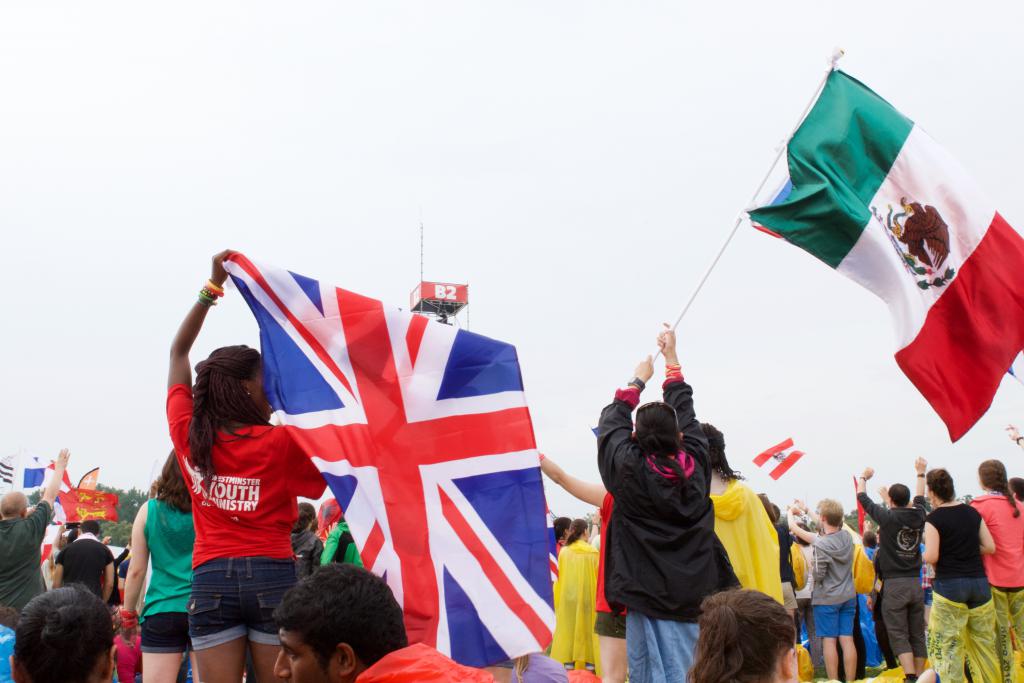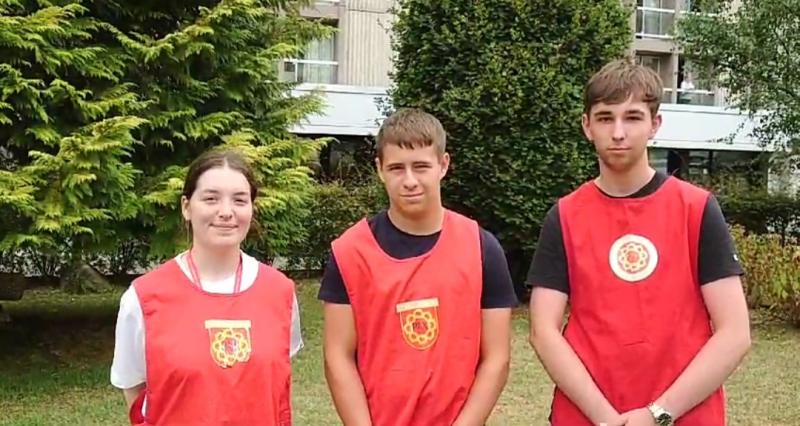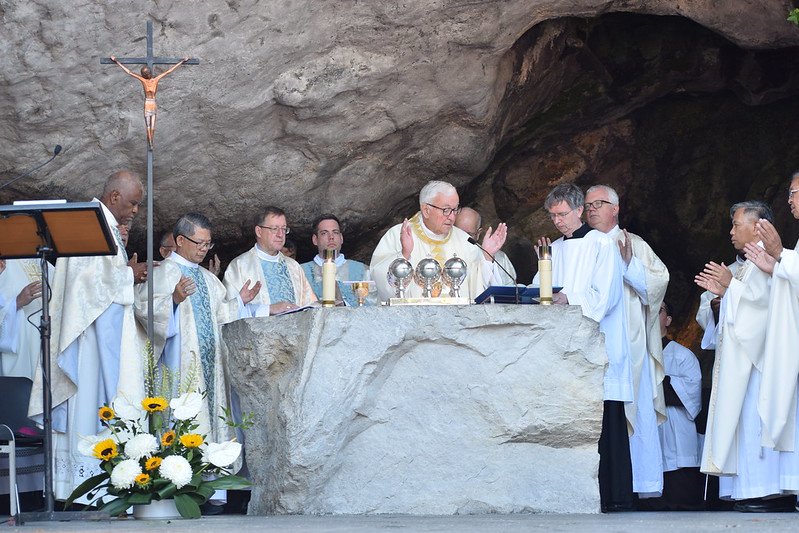After enjoying what will surely be the only lie-in they will get during this pilgrimage, pilgrims set out in their small groups to explore Krakow and discover what lies in store for them in the coming days.
World Youth Day has transformed Krakow, not simply by doubling its population. There are pilgrims to be found everywhere, brandishing rucksacks of red, yellow and blue. Priests, bishops, religious sisters are all intermingled with young people, enjoying the endless entertainment that is on offer. Pilgrim groups proudly stride through the streets waving flags, singing and cheering. There is an immense sense of joy, of friendship and of solidarity amongst those who have come to this city.
As the afternoon went on, groups began to gather at Blonia Park, the site of the opening Mass of World Youth Day which was celebrated by Cardinal Stanislaw Dziwisz, the Archbishop of Krakow. A thunderstorm and the resulting downpour did little to dampen spirits, in thanks partly to the bright yellow ponchos which were gratefully donned by many!
In his homily, Cardinal Dziwisz posed three questions to pilgrims, based on the Gospel heard at Mass when the risen Jesus asks Simon Peter: ‘Do you love me?’ These were: ‘First, where do we come from? Second, where are we today, in this moment of our lives? And third, where are we going to go and what are we going to take with us?’
Addressing his first question, the Cardinal said: 'We bring to this meeting with Jesus during these days our personal experiences of living the Gospel in our difficult world. We bring our fears and disappointments, but also our hopes and yearning, our desire to live in a more human, more fraternal world. We acknowledge our weaknesses, but at the same time believe that “we can do all things through Him who strengthens us” (Phil. 4:13). We can face the challenges of the modern world, in which man chooses between faith and disbelief, good and evil, love and its rejection.’
He went on to reflect on his second question: ‘We are all here because Christ has gathered us. He is the light of the world. Whoever follows Him will not walk in darkness (Jn 8.12). He is the way, and the truth, and the life (Jn 14.6). He has the words of eternal life...It is He who has led us here. He is present among us.’
Finally, Cardinal Dziwisz called on pilgrims to ‘share with each other what is most valuable. Let us share our faith, our experiences, our hopes. My dear young friends, may these days be an opportunity to form your hearts and minds…Open wide the doors of your heart to Christ.'
As WYD veterans can attest, these en-masse events are at the heart of the WYD experience. An estimated 500,000 young people gathered in Blonia Park for the opening Mass, a sign of the strength of faith in future generations. What is striking is the generosity of spirit amongst all pilgrims; in Krakow this week the Church truly is united and universal.
Tomorrow pilgrims begin their day at the Divine Mercy Sanctuary for the Way of Mercy pilgrimage, will have an opportunity to attend the many activities, including the vocations fair, and, in the evening, will celebrate Mass together with Cardinal Vincent at the Church of the Good Shepherd.
Photos from today are available to view here and here.
To read one pilgrim's account of the first day and opening Mass, click here.
The full text of Cardinal Dziwisz’s homily is as follows:
Dear Friends!
Listening to the dialogue of the risen Jesus with Simon Peter on the bank of the Sea of Galilee, hearing the triple question about love and the answer to it, we have in mind the hardships of the life of this fisherman of Galilee that preceded this crucial conversation. We know that he one day left everything – his family, boat and nets – and followed an unusual Teacher from Nazareth. He became His disciple. He learned His way of looking at the matters of God and people. He lived through His passion and death, as well as through a moment of personal weakness and betrayal. Afterwards, he experienced a moment of astonishment and joy connected with Jesus' resurrection, who appeared to His closest disciples before ascending into heaven.
We also know the continuation of the conversation, or rather the trial of love that today's Gospel speaks about. Simon Peter, strengthened by the Holy Spirit, became a brave witness to Jesus Christ. He became a rock of the emerging Church. For all this he paid the highest price in the capital city of the Roman empire – he was crucified like his Master. Peter's bloodshed in the name of Jesus became the seed of faith and initiated the growth of the Church, which engulfed the whole world.
Today, Christ speaks to us in Krakow, at the banks of the Wisła river, which flows through all of Poland – from the mountains to the sea. Peter's experience may become ours and inspire us to reflect.
Let us pose three questions and look for the answers. First, where do we come from? Second, where are we today, in this moment of our lives? And third, where are we going to go and what are we going to take with us?
Where do we come from? We come from “every nation under heaven” (Acts 2:5), like those who came in great numbers to Jerusalem on Pentecost Day, but there are incomparably more of us now than two thousand years ago, because we are accompanied by centuries of preaching the Gospel, which since then has reached the furthest ends of the world. We bring our experience of various cultures, traditions and languages. What we also bring are testimonies of faith and holiness of our brothers and sisters, followers of the risen Lord, of past generations as well as the current generation.
We come from such parts of the world where people live in peace, where families are communities of love and life and where young people can pursue their dreams. But among us are also young people from countries whose people are suffering due to wars and other kinds of conflicts, where children are starving to death and where Christians are brutally persecuted. Among us are young pilgrims from parts of the world that are ruled by violence and blind terrorism, and where authorities usurp power over man and nations, following insane ideologies.
We bring to this meeting with Jesus during these days our personal experiences of living the Gospel in our difficult world. We bring our fears and disappointments, but also our hopes and yearning, our desire to live in a more human, more fraternal and solidary world. We acknowledge our weaknesses, but at the same time believe that “we can do all things through Him who strengthens us” (Phil. 4:13). We can face the challenges of the modern world, in which man chooses between faith and disbelief, good and evil, love and its rejection.
Where are we now, at this moment of our lives? We have come from near and far. Many of you have travelled thousands of kilometres and invested much in your journey to be here. We are in Krakow, the former capital of Poland, to which the light of faith reached one thousand fifty years ago. Polish history was difficult, but we have always tried to remain faithful to God and the Gospel.
We are all here because Christ has gathered us. He is the light of the world. Whoever follows Him will not walk in darkness (Jn. 8:12). He is the way, and the truth, and the life (Jn. 14:6). He has the words of eternal life. To whom shall we go? (Jn. 6:68). Only He – Jesus Christ – is able to satisfy the deepest desires of the human heart. It is He who has led us here. He is present among us. He is accompanying us like He accompanied His disciples headed for Emmaus. Let us entrust Him in these days our matters, fears and hopes. During these days, He will be asking us about love, like He asked Simon Peter. Let us not avoid responding to these questions.
Meeting with Jesus, we simultaneously realize that we all make up a great community – the Church – which surpasses the boundaries established by people and which divide people. We are all God's children, redeemed by the blood of His Son, Jesus Christ. Experiencing the universal Church is a great experience associated with World Youth Day. The image of the Church depends on us – on our faith and sanctity. It is up to us to ensure that the Gospel reaches those who have not yet heard about Christ or have not learnt enough about Him.
Tomorrow, the Peter of our times – Pope Francis – will arrive among us. The day after tomorrow, we will greet him in this same place. In the following days, we will listen to his words and pray together with him. The presence of the Pope at World Youth Day is yet another beautiful and characteristic feature of this celebration of faith.
And finally the third, last question: where are we going and what will we take with us from here? Our meeting will last only a few days. It is going to be an intense, spiritual and, to a certain extent, physically demanding experience. Afterwards, we will return to our homes, families, schools, universities and to our places of employment. Maybe we will make some important decisions during these days? Maybe we will set some new goals in our lives? Maybe we will hear the clear voice of Jesus, telling us to leave everything and follow Him?
With what will we return? It is better to not anticipate the answer to this question. But let us take up a challenge. During these days, let us share with each
other what is most valuable. Let us share our faith, our experiences, our hopes. My dear young friends, may these days be an opportunity to form your hearts and minds. Listen to the catecheses delivered by bishops. Listen to the voice of Pope Francis. Participate wholeheartedly in the divine liturgy. Experience the merciful love of the Lord in the sacrament of reconciliation. Discover also the churches of Krakow, the wealth of the culture of this city, as well as the hospitality of its inhabitants and of those of neighbouring towns, where we will find rest after a day’s rigors.
Krakow is alive with the mystery of Divine Mercy, also owing to humble Sister Faustina and John Paul II, who made the Church and the world sensitive to this specific trait of God. Returning to your countries, homes and communities, carry the spark of mercy, reminding everyone that “blessed are the merciful, for they shall obtain mercy” (Mt 5:7). Carry the flame of your faith and ignite with it other flames, so that human hearts will beat to the rhythm of the Heart of Christ, which is “a flaming fire of love.” May the flame of love engulf our world and rid it of egoism, violence and injustice, so that a civilization of good, reconciliation, love and peace will be strengthened on our earth.
The prophet Isaiah tells us today “how beautiful upon the mountains are the feet of the one bringing good news” (Is. 52:7). John Paul II was such a messenger – He was the initiator of World Youth Day, a friend of youth and families. And you be such messengers. Carry the good news about Jesus Christ to the world. Give testimony that it is both worth it and necessary to entrust Him with our fate. Open wide the doors of your hearts to Christ. Proclaim with conviction like Paul the Apostle, “that neither death, nor life, [...] nor any other creature will be able to separate us from the love of God in Christ Jesus our Lord.” (Rom. 8:38-39)
Amen!




